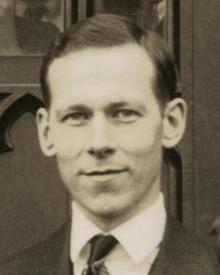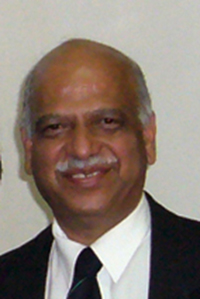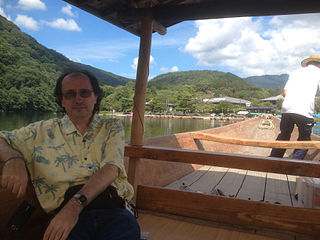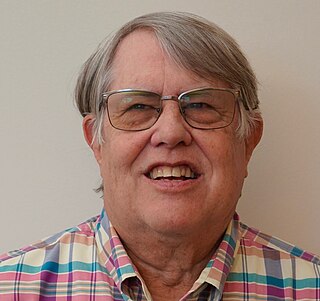
Theoretical chemistry is the branch of chemistry which develops theoretical generalizations that are part of the theoretical arsenal of modern chemistry: for example, the concepts of chemical bonding, chemical reaction, valence, the surface of potential energy, molecular orbitals, orbital interactions, and molecule activation.

Robert Sanderson Mulliken was an American physicist and chemist, primarily responsible for the early development of molecular orbital theory, i.e. the elaboration of the molecular orbital method of computing the structure of molecules. Mulliken received the Nobel Prize in Chemistry in 1966 and the Priestley Medal in 1983.

John Clarke Slater was an American physicist who advanced the theory of the electronic structure of atoms, molecules and solids. He also made major contributions to microwave electronics. He received a B.S. in physics from the University of Rochester in 1920 and a Ph.D. in physics from Harvard in 1923, then did post-doctoral work at the universities of Cambridge (briefly) and Copenhagen. On his return to the U.S. he joined the physics department at Harvard.

James Kazimierz Gimzewski FRS FREng FInstP is a Scottish physicist of Polish descent who pioneered research on electrical contacts with single atoms and molecules and light emission using scanning tunneling microscopy (STM).
Stuart Alan Rice is an American theoretical chemist and physical chemist. He is well known as a theoretical chemist who also does experimental research, having spent much of his career working in multiple areas of physical chemistry. He is currently the Frank P. Hixon Distinguished Service Professor Emeritus at the University of Chicago. During his tenure at the University of Chicago, Rice has trained more than 100 Ph.D. students and postdoctoral researchers. He received the National Medal of Science in 1999.
Rodney Joseph Bartlett is Graduate Research Professor of Chemistry and Physics, University of Florida, Gainesville, US.

Joshua Jortner is an Israeli physical chemist. He is a professor emeritus at the School of Chemistry, The Sackler Faculty of Exact Sciences, Tel Aviv University in Tel Aviv, Israel.
James R. Heath is an American chemist and the president and professor of Institute of Systems Biology. Previous to this, he was the Elizabeth W. Gilloon Professor of Chemistry at the California Institute of Technology, after having moved from University of California Los Angeles.

Shridhar Ramachandra Gadre is an Indian scientist working in computational quantum and theoretical chemistry.

Mark A. Ratner is an American chemist and professor emeritus at Northwestern University whose work focuses on the interplay between molecular structure and molecular properties. He is widely credited as the "father of molecular-scale electronics" thanks to his groundbreaking work with Arieh Aviram in 1974 that first envisioned how electronic circuit elements might be constructed from single molecules and how these circuits might behave.

John P. Perdew is a theoretical condensed matter physicist known for his contributions to the fields of solid-state physics and quantum chemistry. His work on density functional theory has led to him being one of the world's most cited physicists. Perdew currently teaches and conducts research at Temple University.
Sourav Pal (1955-) is an Indian theoretical chemist, former professor of chemistry at IIT Bombay, and former director of the Indian Institute of Science Education and Research, Kolkata. He was a director of the CSIR-National Chemical Laboratory in Pune and an adjunct professor at the Indian Institute of Science Education and Research, Pune.
Eric R. Bittner is a theoretical chemist, physicist, and distinguished professor of chemical physics at the University of Houston.

Piotr Piecuch is a Polish-born American physical chemist. He holds the title of university distinguished professor in the department of chemistry at Michigan State University, East Lansing, Michigan, United States. He supervises a group, whose research focuses on theoretical and computational chemistry as well as theoretical and computational physics, particularly on the development and applications of many-body methods for accurate quantum calculations for molecular systems and atomic nuclei, including methods based on coupled cluster theory, mathematical methods of chemistry and physics, and theory of intermolecular forces. His group is also responsible for the development of the coupled-cluster computer codes incorporated in the widely used GAMESS (US) package.

James R. Chelikowsky is a professor of physics, chemical engineering, and chemistry at The University of Texas at Austin. He is the director of the Institute for Computational Engineering and Sciences' Center for Computational Materials. He holds the W.A. "Tex" Moncrief Jr. Chair of Computational Materials.

Bidyendu Mohan Deb is an Indian theoretical chemist, chemical physicist and a professor at the Indian Institute of Science Education and Research, Kolkata (IISER). he is known for his studies in theoretical chemistry and chemical physics. He is an elected fellow of the International Union of Pure and Applied Chemistry, The World Academy of Sciences, Indian National Science Academy and the Indian Academy of Sciences. The Council of Scientific and Industrial Research, the apex agency of the Government of India for scientific research, awarded him the Shanti Swarup Bhatnagar Prize for Science and Technology, one of the highest Indian science awards, in 1981, for his contributions to chemical sciences.

Albert Stolow is a Canadian physicist. He is the Canada Research Chair in Molecular Photonics, full professor of chemistry & biomolecular sciences and of physics, and a member of the Ottawa Institute for Systems Biology at the University of Ottawa. He is the founder and an ongoing member of the Molecular Photonics Group at the National Research Council of Canada. He is adjunct professor of Chemistry and of Physics at Queen's University in Kingston, and a Graduate Faculty Scholar in the department of physics, University of Central Florida and a Fellow of the Max-Planck-uOttawa Centre for Extreme and Quantum Photonics. In 2008, he was elected a Fellow in the American Physical Society, nominated by its Division of Chemical Physics in 2008, for contributions to ultrafast laser science as applied to molecular physics, including time-resolved studies of non-adiabatic dynamics in excited molecules, non-perturbative quantum control of molecular dynamics, and dynamics of polyatomic molecules in strong laser fields. In 2008, Stolow won the Keith Laidler Award of the Canadian Society for Chemistry, for a distinguished contribution to the field of physical chemistry, recognizing early career achievement. In 2009, he was elected a Fellow of the Optical Society of America for the application of ultrafast optical techniques to molecular dynamics and control, in particular, studies of molecules in strong laser fields and the development of new methods of optical quantum control. In 2013, he was awarded the Queen Elizabeth II Diamond Jubilee Medal (Canada). In 2017, Stolow was awarded the Earle K. Plyler Prize for Molecular Spectroscopy and Dynamics of the American Physical Society for the development of methods for probing and controlling ultrafast dynamics in polyatomic molecules, including time-resolved photoelectron spectroscopy and imaging, strong field molecular ionization, and dynamic Stark quantum control. In 2018, Stolow was awarded the John C. Polanyi Award of the Canadian Society for Chemistry “for excellence by a scientist carrying out research in Canada in physical, theoretical or computational chemistry or chemical physics”. In 2020, he became Chair of the Division of Chemical Physics of the American Physical Society. His group's research interests include ultrafast molecular dynamics and quantum control, time-resolved photoelectron spectroscopy and imaging, strong field & attosecond physics of polyatomic molecules, and coherent non-linear optical microscopy of live cells/tissues, materials and geological samples. In 2020, Stolow launched a major new high power ultrafast laser facility at the University of Ottawa producing high energy, phase-controlled few-cycle pulses of 2 micron wavelength at 10 kHz repetition rate. These are used for High Harmonic Generation to produce bright ultrafast Soft X-ray pulses for a new Ultrafast Xray Science Laboratory.

Ursula Röthlisberger is a professor of computational chemistry at École Polytechnique Fédérale de Lausanne. She works on density functional theory using mixed quantum mechanical/molecular mechanical methods. She is an associate editor of the American Chemical Society Journal of Chemical Theory and Computation and a fellow of the American Association for the Advancement of Science.
Noa Marom is an Israeli materials scientist and computational physicist at Carnegie Mellon University. She was awarded the International Union of Pure and Applied Physics Young Scientist Prize.
Jiří Čížek is a distinguished emeritus professor at University of Waterloo in Canada. Together with colleague Josef Paldus, in 1966 he reformulated the coupled cluster method for the study of electron correlation in atoms and molecules. He is a Fellow of the Royal Society of Canada and has been honored by the International Academy of Quantum Molecular Science.












